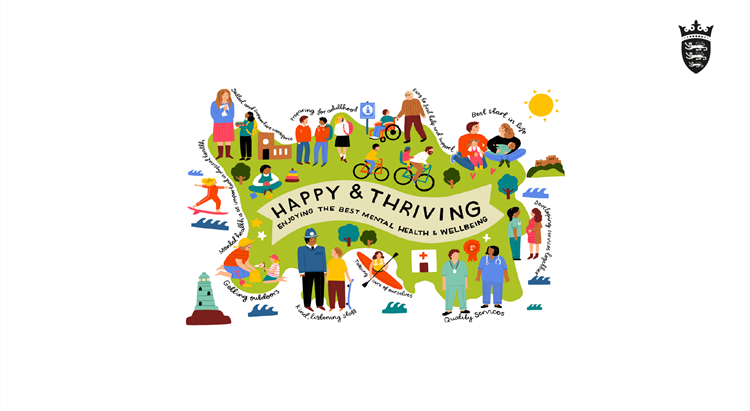14 February 2023

Children, young people, and their parents, carers and families are being encouraged to learn how
they can support their own wellbeing and mental health following Children and Young People’s
Mental Health Week which ran from the 6 to the 12 February.
Importance of mental health
The week highlights the importance of children and young people’s mental health. This year’s
theme, Let’s Connect, encourages children and young people to connect to the networks and
services that can support them.
The theme has been chosen to highlight how many children and young people felt disconnected
following the outbreak of COVID-19 and the resulting changes to their school lives, extra-curricular
hobbies, and ability to spend time with family and friends.
A wide range of support is in place for children and young people who are experiencing specific
mental health issues. All children and young people, families who support them, and the wider
community can take simple steps to help improve children and young people’s overall mental
wellbeing.
Eight ways to wellbeing
The Eight Ways to Wellbeing underpin the Children and Young People’s Mental Health and Wellbeing 2022-2025 Strategy. They include:
- feel nurtured, ensuring that children are loved and nurtured in a home that meets needs
- be active, taking part in physical activity of any kind
- be respected, taking opportunities to be heard and involved in decisions
- be responsible, taking an active role in the community, and in setting meaningful goals
- feel included, linking in with family, friends and neighbours across the community
- stay safe, ensuring children and young people are protected from neglect and harm
- be healthy, taking time to notice what you are thinking, feeling, eating and doing
- keep achieving, setting goals and learning something new outside of formal education
Ministers comments
Minister for Children and Education, Deputy Inna Gardiner, said: “Every single one of us has mental
health, and the Eight Ways to Wellbeing are an important way of understanding all the different
ways we can all support children and young people to improve their wellbeing.
“While the Government is responsible for the statutory service that helps children and young
people stay safe and feel nurtured, we also work to promote wellbeing more generally.
“As well as promoting wellbeing in schools, colleges, and youth clubs, we work in partnership with
charity and voluntary organisations. By working together with organisations, we can support more
individual children, young people, and families to improve their wellbeing.”
Officers comments
Mark Capern, Principal Youth Worker, said: “Feeling Included means taking the time to build
relationships with the people around you. This could mean spending some quality time with your
friends, or with parents, carers, grandparents or siblings. Youth clubs also offer a way to meet new,
like-minded people in a safe and friendly setting: youth clubs run across the Island, and we also run
LGBTQ+ and multilingual youth groups, as well as groups for young carers.
“These groups can help children and young people try new things and develop new skills and
friendships.”
Chief Librarian, Ed Jewell, said: “Jersey Library supports young people to Keep Achieving through
its diverse collections of books, e-books, magazines and audiobooks. We also have a range of
books and digital resources specifically chosen to help young people learn more about their own
wellbeing and mental health.
“The Reading Well for Teens range includes books and digital resources on healthy minds,
managing feelings, body images, neurodiversity, and understanding bereavement and loss.
Children and young people can drop into the town library, or into the branch library at
Communicare and find out more.”
Government of Jersey Food and Nutrition Policy Officer, Beau Waugh, said: “Good nutrition is
a key part of being healthy. A nutritious diet supports children and young people’s cognitive
development and supports their mental health.
“A diet high in fruit, vegetables, fish, and whole grains is linked to a reduced risk of developing
some mental health conditions. A nutritious diet can also help manage the symptoms of mental
health conditions and the side effects from their treatment.
“This is why Public Health is working with schools and families to improve nutrition. We are
working with schools to develop a healthy school food environment through a ‘Whole School
Approach’ and our ‘Food Dudes’ programme encourages children to try new fruits and vegetables.
Our ‘Family Food and Fitness’ programme also offers more targeted support to children and
families to adopt healthy behaviours.”
Service Manager for the Early Intervention Service, Tina Hesse, said: “Being Healthy sounds like
a big ask. However, it can be a simple as taking a moment to really notice what we’re doing,
thinking or feeling.
“So much of the work I do is around taking time to sit with children and young people and identify
what they’re thinking and feeling, and what actions they want to take. This sounds like a small step,
but this helps us develop emotional literacy and regulation which are key tools to developing
wellbeing and resilience.”
More information
More information about support services is available on the mental health website.